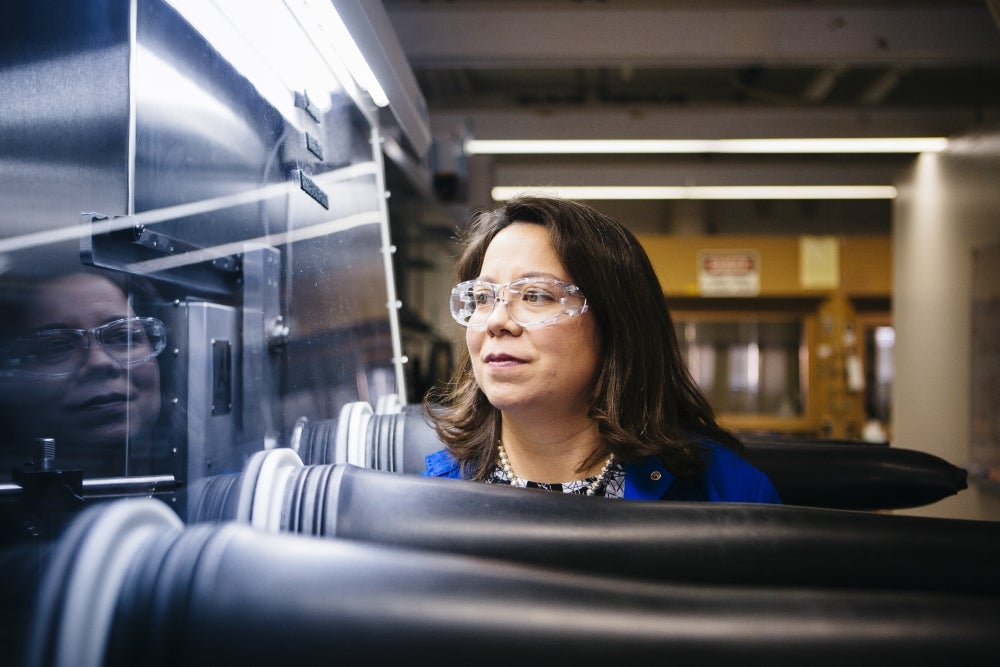
In the Name of Progress
Just days after winning the Ernest Orlando Lawrence Award, the Department of Energy’s highest honor for mid-career scientists, Rachel Segalman, professor and chair of UC Santa Barbara’s Chemical Engineering Department, learned she’d received another top honor — the Andreas Acrivos Award for Professional Progress in Chemical Engineering, among the American Institute of Chemical Engineers’ (AIChE) most prestigious prizes.
The AIChE annually presents the Professional Progress Award in recognition of one researcher’s sustained intellectual leadership and significant contributions to the field of chemical engineering. Segalman was recognized for “pioneering studies of functional soft materials including semiconducting block polymers, polymeric ionic liquids, and hybrid thermoelectric materials.”
“Much like the Lawrence Award, the Acrivos Professional Progress Award is special because some of my personal heroes have won it,” said Segalman, referencing Frances Arnold (2004) and Matthew Tirrell (1998), the former dean of UCSB’s College of Engineering. “While the Lawrence Award is special because of its stature in the U.S. government, the Acrivos Professional Progress is a recognition from my peers.”
Segalman’s research focuses on controlling the self-assembly, structure, and properties in functional polymers. Structural control over soft matter through microscopic length scales is a key tool for optimizing properties in applications ranging from solar and thermal energy to biomaterials.
An elected member of the National Academy of Engineering and a fellow of the American Academy of Arts and Sciences and the American Physical Society, Segalman’s work has provided key insights into the molecular basis for the thermoelectric effect in organic molecules, an essential step to subsequent advances in organic thermoelectrics, a field in which she has emerged as a pioneer through her fundamental advances in the science of molecular thermoelectrics and engineering their design.
Segalman also has made important connections between the molecular and mesoscale structure of polymers and their ability to transport electronic and ionic charge, most recently demonstrating superionic conduction in polymers. She is associate director of the Materials for Water and Energy Systems, which seeks to make similar connections with application to the purification of water from perniciously contaminated sources.
“We are extremely proud to congratulate Rachel Segalman on receiving one of the highest honors awarded in chemical engineering,” said Tresa Pollock, interim dean of the College of Engineering and the Alcoa Distinguished Professor of Materials. “Peer recognition of her pioneering studies on functional soft materials and their impact in the chemical engineering and materials science disciplines is well deserved.”
Acrivos is an internationally recognized educator and researcher who helped transform the field of chemical engineering, especially in the areas of fluid mechanics, heat and mass transfer. His research on the flow of viscous fluids made it possible to model, analyze and engineer chemical and fluid processes, with applications in industries such as microelectronics and petroleum recovery.
Segalman briefly shared an office with Acrivos while she was an assistant professor at UC Berkeley and he was on sabbatical.
“He was visiting Berkeley for my first few months on faculty,” she recalled. “His mentorship and especially his warmth and welcome to academia made a lasting impression on my career — to this day, they remind me how important that first welcome is in a career. So, it is particularly thrilling to receive this award that is named after him.”
Segalman will receive the award in November, at an honors ceremony during the 2022 AIChE Annual Meeting.



